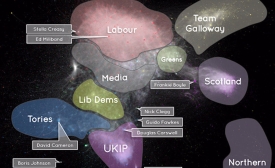On the first Friday of each month The Interpreter will publish Digital Diplomacy links instead of the weekly Digital Asia links. As Australian digital diplomacy strives to catch up to the rest of the world, these links will highlight the most creative and effective ways countries are leveraging the internet for foreign policy gain.
When India’s premier wanted to signal a thaw in relations with rival Pakistan recently, he didn’t call a press conference or make a televised speech. He tweeted. (...) Since Mr. Modi took office last year as leader of the world’s largest democracy, policy pronouncements have come in 140-character snippets. He has used Twitter and other social-media services to engage in diplomacy and build his image in a way few other global leaders have.
The increasing availability of data is pushing the boundaries of what was once imagined possible in public diplomacy. Data science has the potential to draw large data sets into the study and practice of diplomacy, and allow diplomats and scholars to become comfortable engaging with and analyzing increasingly large and often unstructured data.

Ali Fisher on the diplomatic potential of campaign-related tweets.
Prime minister Narendra Modi is the third most followed and fifth most influential leader globally, according to a new report called Twiplomacy 2015, a study of world leaders on Twitter Inc by global public relations and communications firm Burson-Marsteller. The study identified 669 Twitter accounts of heads of state and government, foreign ministers and their institutions in 166 countries worldwide to analyse each leader’s Twitter profile, tweet history, and connections with the others.
Plenty of diplomatic deals get done on the margins of global get-togethers, but one conducted on Twitter in 2014 made Prime Minister Stephen Harper a digital star among his fellow world leaders.(...) Most world leaders use the social media tool to broadcast specific messages; Harper is among many who don't generally reply when messages are sent their way.
After a decade of swimming against the tide, the Australian Government is slowly engaging in the world of digital diplomacy. (...) Today, digital diplomacy is a foreign policy essential. We live in a world where state and non-state entities all compete for influence and power in the same online space.
While American negotiators maintained tight secrecy at the nuclear talks here, President Hassan Rouhani of Iran took to Twitter late Thursday to describe a letter he sent to President Obama and other world leaders justifying Iran’s positions.







